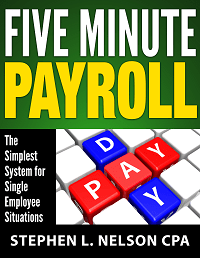
Over the next few weeks, I’m going to cover several topics related to state taxes, including how to legally employ people (including yourself) in several large states and also how to do your income tax accounting when you spread business income over several different states.
This week: a quick post about hiring a worker in Texas. Our firm serves a growing number of Texas-based consultants and also Washington-based businesses that have a footprint in the Lone Star state.
Texas Workforce Commission Collects Unemployment Taxes
Here is the first easy thing to know: Like most states, Texas requires employers to pay a state-level unemployment tax. You are required to pay this tax even if you’re a shareholder-employee and the only employee of the business.
In Texas, you only pay unemployment insurance on the first $9,000 of wages for each employee. The unemployment insurance tax rate is based on a number of factors, including the employer’s claim history, but falls somewhere between 0.54% and 7.35%. The average rate for the year is on the lower end of that spectrum though, at 1.82%. New businesses or new employers are subject to a minimum 2.7% rate for their first year of operation.
Per the law, you should register as an employer when you hire your first employee (Again, this might be just you). You can register quickly and fairly easily using the Texas Workforce Commission’s online website (click here to visit that).
Workers Compensation in Texas
The Texas Department of Insurance regulates the workers compensation system that covers employees injured on the job. Acccordingly, you can get scads of information about how this insurance works by visiting their website (click here for more information).
One big thing that’s probably of interest to most small, one-person employers is this: You don’t have to provide workers compensation insurance coverage. In other words, if you’re a one-man or one-woman business and you decide you don’t need or want insurance for work-related injuries, you can choose not to buy or pay for the insurance.
A Word About the Texas Franchise Tax
While the state of Texas doesn’t levy income taxes on its residents, the state does have a bunch of business-related and activity-specific taxes. And one of these business taxes that will affect potentially any type of business set up as a corporation or a limited liability company (or any other similar entity) is the Texas Franchise Tax.
Why? Because Texas levies its franchise tax on limited liability entities for the privilege of doing business within the state.
When you’re ready to file your franchise tax return (if you’re doing this work yourself rather than shopping it out to an accountant), you can get very specific information about the mechanics of the franchise tax here.
In the meantime, do note that the Texas franchise tax runs from .575% to 1% on either total revenue earned in the state (if the entity uses the EZ filing method) or on something called “taxable margin”, which is a smaller amount because of adjustments for either compensation or costs of goods sold.
However, small entities with less than $10,000,000 in revenue pay at the roughly half a percent rate, by the way, while those over that threshold pay at the one percent rate.
And very relevant to most entrepreneurs: Many small business entities don’t actually have to pay franchise tax. Entities with less than $1,030,000 in revenue in 2013 (a higher threshold applies in future years if there’s inflation) don’t pay the franchise tax. Further, sole proprietorships don’t pay the franchise tax, though single member limited liability companies, even if they’re taxed as sole proprietorships, can be eligible the franchise tax.
Here’s a link to the 2013 Texas franchise tax form and instructions pamphlet: http://comptroller.texas.gov/taxinfo/taxforms/05-399.pdf.
A final quick note: The Texas franchise tax return (and any payment) is due May 15 of the following year.
Five Minute Payroll System ebook (2017 Edition)
Are you a one-employee small business? Maybe a one person S corporation where you are the only shareholder-employee, for example?
If you want to save some money on your payroll and (most importantly) save some time, you may be interested in our quick and dirty approach to payroll. You need to understand the state-level tax stuff described on this page. And you want to peek at our post here.
If you decide to do payroll for a one employee situation yourself, you may also be interested in an ebook monograph we publish, “Five Minute Payroll.”
The Five Minute Payroll ebook explains how to do simple cookie-cutter payroll for most one-employee S Corporations using base salary amounts of $10,000 a quarter or $16,000 a quarter. (These amounts, especially if combined with a pension or health benefits, will work for almost everyone.) The e-book includes sample IRS forms you can copy to get your quarter end or year end payroll done in a few minutes. And the e-book provides some common-sensed tips you can use to set a reasonable salary for your S corporation and to minimize your state payroll taxes burden, too.
Interested in buying this monograph? Use this button:
As with all of our monographs and ebooks, our products come with a money back guarantee. If you don’t think what we deliver for $20 is worth it, just let us know and we’ll refund your purchase price. We make this promise to you confident that paying $20 once to save $400 a year (Gusto Payroll?) or $500 a year (Paychex?) or $1000 a year (ADP?) from now on will be a great investment.(Note, too, that the biggest saving to you probably won’t be the money but the time.)
